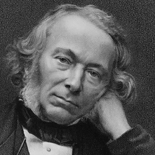Featured
Richard Cobden saw Britain’s international standing in terms of peaceful trade rather than military interventions.
In 1855, Cobden urged Parliament to tone down its anti-Russian rhetoric, not out of any fondness for St Petersburg’s domestic or foreign policy but because British influence was better felt in industrial innovation and international trade than in annexing land, toppling governments or rattling the Russian bear’s cage.
Richard Cobden called on Parliament to support small, family-owned farms.
In 1864, Richard Cobden MP published an open letter arguing that small-holdings owned by the farmer, with the absolute right of inheritance, were the best guarantee of public morality and national prosperity. He began with the claim of public morality, arguing that the Government’s policy of super-farms was a step back towards feudalism, and a blow to aspiration.
Richard Cobden wondered how the architects of the British Empire had the nerve to accuse Russia of imperialism.
In 1854, British feeling was running high against Russia. That March, Britain had sided with Turkey in the Crimean War of 1853-56, and anxious journalists and politicians pointed accusing fingers at Russia’s military manoeuvres around the Baltic and the Black Sea, scolding her for her greed and disrespect for her neighbours’ sovereignty. Richard Cobden wondered if there was something amiss with his hearing.
Richard Cobden deplored the way that politicians in Britain justified their wars abroad by portraying other countries as barbarous and backward.
In 1856, Chinese authorities in Canton arrested twelve sailors on a ship out of Macau that was flying British colours, albeit without a current licence. The sailors were released but the British went ahead and bombarded Canton for three weeks anyway, saying that force was all the Chinese understood. Richard Cobden protested in the House of Commons.
Richard Cobden wanted to know why British policy towards China was so different to our policy towards the USA and European powers.
On October 8th, 1856, Chinese authorities in Canton arrested twelve sailors for piracy. Sir John Bowring, governor of Hong Kong, demanded their release, as their ship the Arrow had flown (albeit illegally) a British flag. On the 22nd the obliging Chinese delivered the suspects up; on the 23rd, the Royal Navy nonetheless began a three-week bombardment of Canton. The following February, Richard Cobden expressed his outrage in the Commons.
Richard Cobden questioned both the wisdom and the motives of politicians who intervene on foreign soil.
At the Vienna Congress in 1815, Napoleon’s former empire was shared out by Britain and other European Powers. A semi-autonomous Kingdom of Poland was allotted to Russia, which Russian troops occupied in response to the November Uprising of 1830-31. Calls grew loud for the British and Turkish Empires to restore ‘the balance of power’, but Richard Cobden heard only arrogant self-preservation.
Richard Cobden was not a little envious of the USA’s open and can-do society, but he did not covet her republicanism.
In 1835 the USA stood for strict public economy (that year the national debt hit zero for the first and last time), military restraint, and wise investment of taxpayers’ dollars. These things, Richard Cobden believed, England could usefully copy; but not republicanism. A British republic, he said, she would merely replace one kind of aristocracy with a much less noble one.
